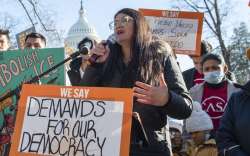US House censures Palestinian-American lawmaker Rashida Tlaib for criticism of Israel
The House voted 234-188 to censure Tlaib for her increasingly critical remarks on Israel as the death count in Gaza Strip crossed 10,000. Tlaib's colleagues raised concerns for her alleged anti-semitic rhetoric and spreading falsehoods about the US ally.

In a major development, the US House of Representatives voted to censure the only Palestinian-American lawmaker in the Congress, Rashida Tlaib, for her criticism of Israel in the ongoing war against the Hamas group. The House voted 234-188 to censure Tlaib, with enough Democrats joining to rebuke her statements.
Republican Representative Rich McCormick, who introduced the censure measure, accused Tlaib of promoting anti-semitic rhetoric and levying "unbelievable falsehoods about our greatest ally, Israel".
On the other hand, Tlaib defended her stance, saying that she "will not be silenced and I will not let you distort my words." She maintained that her criticism was directed towards the Israeli government and the leadership under Benjamin Netanyahu.
"It is important to separate people and government. The idea that criticizing the government of Israel is antisemitic sets a very dangerous precedent. And it's been used to silence diverse voices speaking up for human rights across our nation," said the lawmaker.
Earlier efforts to censure Tlaib
It is important to mention here that the Palestinian-American lawmaker has family in the occupied West Bank. She came under heavy criticism after failing to condemn the brutal surprise attack by Hamas on October 7 that killed over 1,400 people in Israel.
Democrats stood in her favour and helped defeat an initial censure measure last week against Tlaib. However, many of her colleagues, including Jewish members, became concerned after she used a slogan that is believed to call for the eradication of Israel.
"It is nothing else but the call for the destruction of Israel and murder of Jews. I will always defend the right to free speech. Tlaib has the right to say whatever she wants. But it cannot go unanswered," said Democrat Brad Schneider.
Tlaib will become the second Muslim-American woman in Congress to be formally admonished this year for her criticism of the Jewish state. Republican lawmaker Ilhan Omar was removed in February for similar remarks against Israel.
Divisions in the US over Israel-Hamas war
While the majority of both parties have historically stood firmly on the side of Israel, divisions have emerged in the Democratic Party about the American response. Some on the left have criticized President Joe Biden's stance and urged him to put conditions on US support for Israel as its aggressive military campaign drives the Palestinian death count higher.
Censure had long been viewed as a punishment of last resort, just one step below expulsion and to be triggered only for the most egregious wrongdoing. But censure resolutions are quickly becoming routine in the chamber, often wielded in strikingly partisan ways.
Many Democrats and some Republicans who opposed censuring Tlaib cited free speech and warned of the precedent it would set.
Recently, Biden called for a 'humanitarian pause' amid rising calls for a ceasefire. "I think we need a pause," said Biden after his campaign speech in Minneapolis was interrupted by a protester calling for a ceasefire. Notably, the US President has faced intense pressure from human rights groups, world leaders and members of his own Democratic Party, who say that Israel's bombardment of Gaza is a 'collective punishment'.
When asked to clarify what a pause meant, he said: “A pause means give time to get the prisoners out. Give time. This is incredibly complicated for the Israelis. I can thoroughly understand the emotions on the Palestinian side of the argument and the Jewish side of the argument.”
Biden's stance represented a subtle departure from the US' initial stance since the war broke out, saying that they would not dictate how Israel carries out its military operations in retaliation for the October 7 attack.
(with input from agencies)
ALSO READ | Israel-Hamas War: Gaza becoming 'graveyard for children', says UN chief as conflict continues to rage

